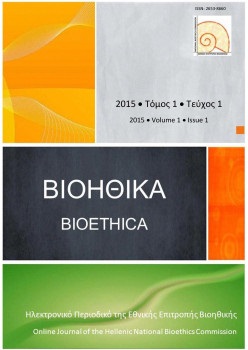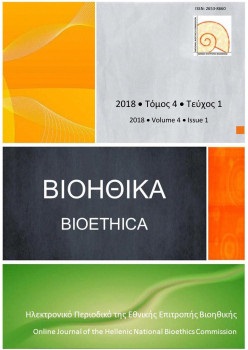Tο δικαίωμα των ομοφυλόφιλων προς απόκτηση απογόνων στην Ελλάδα

Περίληψη
Η μεταστροφή των τελευταίων δεκαετιών που παρατηρείται αναφορικά με τα δικαιώματα των ομοφυλόφιλων ατόμων δε θα μπορούσε παρά να έχει αντίκτυπο και στην αναγνώριση της δυνατότητας προσφυγής τους στις μεθόδους Ιατρικώς Υποβοηθούμενης Αναπαραγωγής (ΙΥΑ) ή στην υιοθεσία προς απόκτηση απογόνων.
Ο Έλληνας νομοθέτης, καίτοι επέδειξε δείγματα προοδευτικότητας υιοθετώντας νομοθετικά κείμενα που αποσκοπούν στην προστασία των δικαιωμάτων των ομοφύλων, παρόλα αυτά επέλεξε να μην περιλάβει τα ομόφυλα ζεύγη στο ν. 3719/2008 που ρυθμίζει το σύμφωνο συμβίωσης.
Οι συζητήσεις στην Ελλάδα για την ένταξη των ομοφύλων στο σύμφωνο συμβίωσης είχαν ξεκινήσει ήδη κατά την σύνταξη και ψήφιση του σχετικού νόμου. Η συζήτηση αυτή έχει αναβιώσει εκ νέου μετά την καταδίκη της χώρας μας από το ΕΔΔΑ στην υπόθεση Βαλλιανάτος και λοιποί κατά Ελλάδος.
Προς το παρόν, ωστόσο, η αποτύπωση της νομικής κατάστασης στην Ελλάδα αναφορικά με το δικαίωμα πρόσβασης των ομόφυλων ατόμων στην ΙΥΑ ή στην υιοθεσία προς απόκτηση απογόνων οδηγεί στα ακόλουθα συμπεράσματα. Καταρχήν, καίτοι στο άρθρο 5 §1 Σ κατοχυρώνεται το δικαίωμα του προσώπου στη φυσική αναπαραγωγή, η σύγχρονη ελληνική πραγματικότητα αποδεικνύεται διαφορετική και τα ομόφυλα άτομα και δη τα ομόφυλα ζευγάρια στη χώρα μας δεν έχουν δικαίωμα πρόσβασης στις μεθόδους ΙΥΑ. Στην πράξη, ωστόσο, δεν μπορεί να αποκλειστεί (και αυτό είναι το συνήθως συμβαίνον) το ενδεχόμενο να αποκτήσει παιδί ένα ομόφυλο ζευγάρι γυναικών, αν η μία από τις συντρόφους που αντιμετωπίζει πρόβλημα υπογονιμότητας ή στειρότητας προσφύγει σε γιατρό και ζητήσει την υποβολή της σε μέθοδο ΙΥΑ εμφανιζόμενη ως μόνη άγαμη γυναίκα. Αντίθετα, οι ομόφυλοι άνδρες δεν έχουν καμία δυνατότητα να προσφύγουν είτε μόνοι τους είτε ως ζευγάρι στις τεχνικές της υποβοηθούμενης αναπαραγωγής.
Σε ό τι αφορά την προσφυγή των ομόφυλων ατόμων στην υιοθεσία στα άρθρα 1452 επ. ΑΚ δε γίνεται καμία ειδική αναφορά ούτε στο φύλο ούτε στο σεξουαλικό προσανατολισμό των υιοθετούντων. Έτσι, καταρχάς είναι δυνατόν ένα ομόφυλο πρόσωπο να υιοθετήσει μόνο του ένα παιδί. Ωστόσο, για ένα ομόφυλο ζευγάρι δεν υπάρχει η δυνατότητα ελέγχου από την αρμόδια κοινωνική υπηρεσία. Σύμφωνα με το άρθρο 1545 ΑΚ δεν είναι δυνατή η υιοθεσία του ίδιου προσώπου ταυτόχρονα από περισσότερα άτομα, εκτός αν αυτά είναι σύζυγοι. Με δεδομένο, όμως, ότι στην Ελλάδα για τους ομόφυλους δεν επιτρέπεται ο γάμος με την τέλεση του οποίου θα λάμβαναν τα μέρη την ιδιότητα των συζύγων, δεν μπορεί να γίνει λόγος για υιοθεσία ενός παιδιού από ομόφυλο ζευγάρι.
Ενόψει των ανωτέρω προκύπτει σαφώς η ανάγκη για τον εκσυγχρονισμό του Οικογενειακού Δικαίου στην κατεύθυνση της προστασίας των σχετικών δικαιωμάτων των ομοφύλων σε μια προσπάθεια ανταπόκρισης στα σύγχρονα κοινωνικά δεδομένα.
Λεπτομέρειες άρθρου
- Πώς να δημιουργήσετε Αναφορές
-
Κηπουρίδου (Kalliopi Kipouridou) Κ., & Μηλαπίδου (Maria Milapidou) Μ. (2015). Tο δικαίωμα των ομοφυλόφιλων προς απόκτηση απογόνων στην Ελλάδα. Βιοηθικά, 1(1), 32–45. https://doi.org/10.12681/bioeth.19785
- Ενότητα
- Πρωτότυπες Εργασίες
Οι Συγγραφείς που δημοσιεύουν εργασίες τους σε αυτό το περιοδικό συμφωνούν στους παρακάτω όρους:
- Οι Συγγραφείς διατηρούν τα Πνευματικά Δικαιώματα και χορηγούν στο περιοδικό το δικαίωμα της πρώτης δημοσίευσης, ενώ ταυτόχρονα τα πνευματικά δικαιώματα της εργασίας προστατεύονται σύμφωνα με την Creative Commons Attribution CC BY 4.0, που επιτρέπει άμεση πρόσβαση στις εργασίες και κάθε χρήστη να διαβάζει, να κάνει λήψη, να αντιγράφει, να διανέμει, να εκτυπώνει, να αναζητά, ή να συνδέει με το πλήρες περιεχόμενο των άρθρων, να τα αναζητά για ευρετηρίαση, να τα χρησιμοποιεί ως δεδομένα σε λογισμικό, ή να τα χρησιμοποιεί για οποιοδήποτε άλλο νόμιμο σκοπό. Προϋπόθεση ε΄ιναι η αναφορά στον αρχικό δημιουργό/ούς και την αρχική δημοσίευση σε αυτό το περιοδικό.
- Οι Συγγραφείς μπορούν να συνάπτουν ξεχωριστές, και πρόσθετες συμβάσεις και συμφωνίες για την μη αποκλειστική διανομή της εργασίας όπως δημοσιεύτηκε στο περιοδικό αυτό (π.χ. κατάθεση σε ένα ακαδημαϊκό καταθετήριο ή δημοσίευση σε ένα βιβλίο), με την προϋπόθεση της αναγνώρισης και την αναφοράς της πρώτης δημοσίευσης σε αυτό το περιοδικό.
Το περιοδικό Βιοηθικά επιτρέπει και ενθαρρύνει τους συγγραφείς να καταθέτουν τα δημοσιευμένα άρθρα σε θεσμικά (π.χ. το αποθετήριο του Εθνικού Κέντρου Τεκμηρίωσης) ή θεματικά αποθετήρια (π.χ. αποθετήριο SSOAR για τις Κοινωνικές Επιστήμες), μετά τη δημοσίευσή τους στο περιοδικό «Βιοηθικά» και με όρους Ανοικτής Πρόσβασης, όπως κατά περίπτωση προσδιορίζονται από τους χρηματοδότες της έρευνάς τους ή/και τα ιδρύματα με τα οποία συνεργάζονται.
Κατά την κατάθεση της εργασίας τους, οι συγγραφείς πρέπει να παρέχουν πληροφορίες σχετικά με τη δημοσίευση του άρθρου στο περιοδικό «Βιοηθικά» και τις πηγές χρηματοδότησης της έρευνάς τους.
Κατάλογοι των ιδρυματικών και θεματικών αποθετηρίων ανά χώρα υπάρχουν στη βάση http://opendoar.org/countrylist.php . Οι συγγραφείς έχουν τη δυνατότητα να καταθέσουν χωρίς κόστος την εργασία τους στο αποθετήριο www.zenodo.org, το οποίο υποστηρίζεται από το OpenAIRE (www.openaire.eu ), στο πλαίσιο των πολιτικών της Ευρωπαϊκής Επιτροπής για την ενίσχυση της Ανοικτής ακαδημαϊκής έρευνας.



